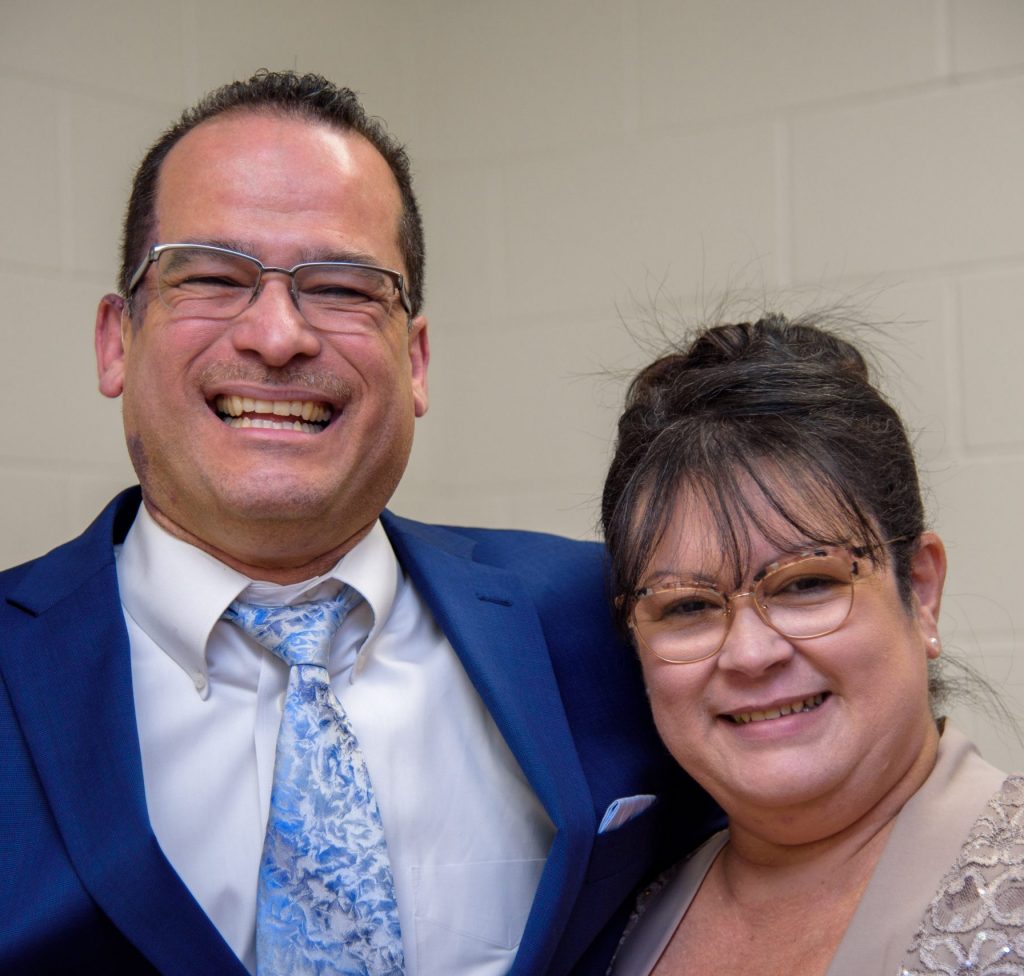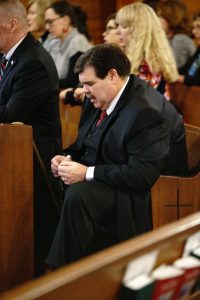January 16, 2020 // Bishop
Twenty-one admitted to candidacy for Order of the Diaconate
During an evening Mass Jan. 11 celebrating the feast of the Baptism of the Lord, 21 aspirants from the Diocese of Fort Wayne-South Bend celebrated the Rite of Admission to Candidacy for the diaconate.
“After a year of formation as aspirants for the Order of the Diaconate, they have arrived at the moment when they express openly their desire to serve the Lord and His Church as deacons,” Bishop Kevin C. Rhoades said in his homily. “They have been recommended to me as men suitable for further formation for the diaconate. So during this Mass I will accept them officially as candidates for Holy Orders.”
The men’s spouses, family, parish priests, spiritual directors, teachers and well-wishers attended, celebrating Mass at St. Martin de Porres Church, Syracuse. Deacons from across the diocese were also in attendance, including several representing the first all-Hispanic diaconate group, who were ordained in July 2018.
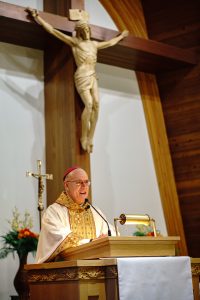 During the homily, Bishop Rhoades noted that the diaconate is a “living icon in the Church of Christ the Servant. That’s what a deacon is called to be. It’s what the very word ‘deacon’ means, ‘servant.’”
During the homily, Bishop Rhoades noted that the diaconate is a “living icon in the Church of Christ the Servant. That’s what a deacon is called to be. It’s what the very word ‘deacon’ means, ‘servant.’”
It is this servant, Jesus, “whom deacons are ordained to serve and to imitate, of whom they are to be living icons in the Church, living images of the One who said that He came not to be served, but to serve,” he said. “I think it is very meaningful that these men, our brothers, are admitted into Candidacy on this Feast of the Baptism of the Lord,” he added.
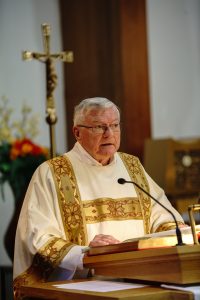 The Mass and its accompanying rite marked the end of a year of study, formation and discernment for the newly received candidates. According to Deacon Stan LeMieux, director of diaconate formation for the diocese, the candidates participated in a new curriculum instituted by Bishop Rhoades and the Department of Theology at the University of Notre Dame. Classes were taught by Dr. Timothy Matovina, chairman of the Department of Theology at Notre Dame, and Dr. John C. Cavadini, director, McGrath Institute for Church Life. “So these guys had world-class theologians teaching their classes,” said Deacon LeMieux.
The Mass and its accompanying rite marked the end of a year of study, formation and discernment for the newly received candidates. According to Deacon Stan LeMieux, director of diaconate formation for the diocese, the candidates participated in a new curriculum instituted by Bishop Rhoades and the Department of Theology at the University of Notre Dame. Classes were taught by Dr. Timothy Matovina, chairman of the Department of Theology at Notre Dame, and Dr. John C. Cavadini, director, McGrath Institute for Church Life. “So these guys had world-class theologians teaching their classes,” said Deacon LeMieux.
The size of the class of deacons — almost twice as many men as in previous years — is evidence of the growing visibility of the diaconate in the diocese, according to Deacon LeMieux.
“The diaconate is becoming more visible to people,” he said. “Parishioners can see what permanent deacons do, and the Holy Spirit is calling guys to serve in this way.” Indeed, several of the candidates noted that it was the presence of a deacon serving in their parish that planted the seed for them to pursue ordination.
James Summers, a candidate from St. Pius X, Granger, said that he was inspired to pursue the diaconate through volunteering as a lector in his parish and by serving on the Black Catholic Advisory Board with Deacon Mel Tardy.
Max Ortega had a similar story. “When I was living in Mexico many years ago, we had a man studying to become a permanent deacon in our parish. I thought it would be very good for our parish to have a permanent deacon. That planted the seed.” Ortega added that the ministry of two deacons, Deacon Victor Sandoval, at his current parish of St. Patrick, Fort Wayne, and Deacon Huberto Vasquez, that reignited his interest in becoming a deacon himself.
“Now I saw, once again, how good this is for our parish and I said, ‘Okay. God is calling me to do the same.’”
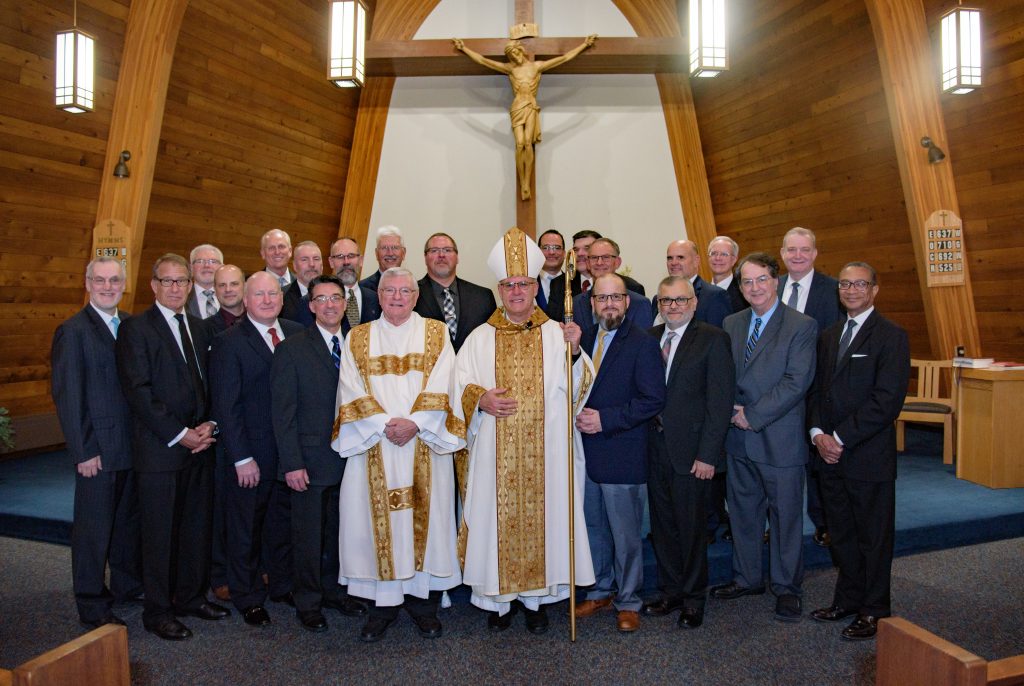
Photos by Nate Proulx
Aspirants to the Sacred Order of the Diaconate stand with Bishop Kevin C. Rhoades and director of diaconate formation Deacon Stan LeMieux, center left, following a Mass with Rite of Admission to Candidacy Jan. 11. The men will continue their formation for three more years before being ordained as what the bishop called a “living icon in the Church of Christ the Servant.”
Bishop Rhoades addressed the candidates directly, offering three directives as they continue their formation toward ordination. “First, focus on Jesus as the Servant of the Lord, the Suffering Servant prophesied by Isaiah, the One identified by the Father as His beloved Son in whom He is well pleased. Throughout your formation over the next three years, strive to be images of Christ the Servant. Never forget that, in Christ, you are beloved sons of the Father. This is the core of our identity.”
“Second,” he added, “at His Baptism, Jesus joined the ranks of sinners, showed His solidarity with sinners, even though He was without sin. … The mission of the ordained bears fruit the more we are cleansed of sin and are clearer signs or images of the Lord, whom we serve. So I encourage you to pursue holiness, especially your regular reception of the Sacrament of Penance.”
Bishop’s third point for the candidates dealt with the life of prayer. “Prayer is entering that living relationship we have with God in Baptism. We must allow ourselves to be drawn into the mystery of God’s life, his Trinitarian love.”
“This is what prayer is all about,” he continued. “My brothers, it is in prayer during these next few years that you are called to discern the will of God regarding a vocation to the diaconate. And it is in prayer that you will obtain the endurance to complete your diaconal formation. So I encourage you to be devoted to a disciplined life of prayer.”
Prayer is one area in which candidate Orlando Miranda, St. Joseph Parish, Fort Wayne, has seen his faith grow through the formation process. “Learning how to pray and getting yourself deeper into prayer when you do it has been very rewarding for me,” he said.
Finding time for classes and studying has been a challenge, he admitted, as a husband, father of five and full-time sales manager in the food industry. Planning is key, he said, and leaving some “wiggle room for the Holy Spirit” to change up a well-planned week.
The support of the candidate’s family, especially his spouse, is central to success over the five-year process from initial application to the diaconate program through to ordination. Wives are encouraged to attend classes with their husbands.
Sharing the commute and class-time with his wife, Elaine, is one of Dan Avila’s favorite things about his formation journey. The Avilas are parishioners at St. Joseph Parish, Roanoke.
“As wives we get to go to the classes, but we don’t have to do the homework,” Elaine quipped, as she and Dan shared a laugh.
Ed Fox is a candidate from St. John the Baptist Parish, Fort Wayne, where he serves as director of religious education. His wife, Kathy, passed away six years ago, but he has found strength and encouragement from his brother candidates.
“The most rewarding thing is all these brothers and their wives. We are a family, a pack of brothers. They are helping my faith grow,” he said.
The best news. Delivered to your inbox.
Subscribe to our mailing list today.







